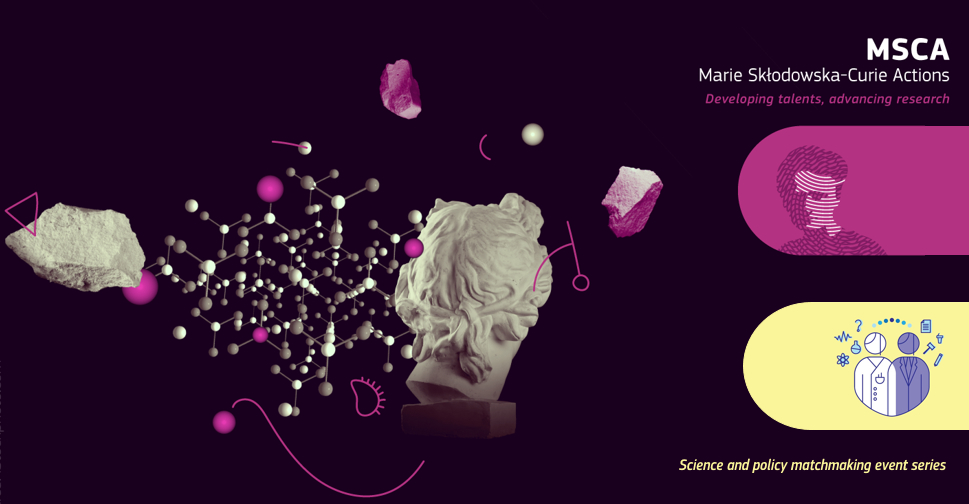-
The event helped raise awareness about the opportunities to be hosted by public administration bodies under the MSCA, notably through secondments and the newly introduced 6-month non-academic placements in Postdoctoral Fellowships
-
Almost 100 participants interacted in thematic breakout rooms dedicated to exploring synergies, hosting opportunities and joint applications
-
More than 10 public administration bodies, international organisations, and policy organisations were represented and offered their premises to host MSCA fellows
On 31 May 2022, the European Commission’s Directorate-General for Education, Youth, Sport and Culture (DG EAC) and the European Commission’s Joint Research Centre (JRC) jointly organised their first Science and policy matchmaking event: “Linking researchers and policymakers for MSCA non-academic placement opportunities”.
Almost 100 participants attended the event. Most of them were early-career researchers at their postdoctoral or doctoral level, research managers, and representatives from different public administration bodies, international organisations and civil society organisations.
Viviane Hoffmann, Deputy Director-General of DG EAC, opened the event highlighting the importance of science for policy to address shared challenges and complex crises, and to support our citizens in the sea of misinformation and fake news. She also stressed the openness of the Marie Skłodowska-Curie Actions (MSCA) to any type of organisations – on top of the most represented academic institutions, the MSCA encourage participation by enterprises and industry, public administrations, civil society organisations, etc. In fact, inter-sectoral cooperation is one of the main priorities of the programme.
The MSCA offer the possibility for career researchers to conduct research and analysis on and within public administration. However, according to the H2020 participation figures presented during the event, only 1% of MSCA participating organisations belonged to the public administration sector. This stands in contrast to the finding of the MCAA Major Survey 2020 that public administrations are among the top employers for MSCA alumni.
The importance of fostering inter-sectoral mobility is also illustrated by the worldwide successful examples of fellowship schemes that allow career scientists to experience working in policymaking for a year. One example of a newly-established successful scheme is the SFI Public Service Fellowship, launched by Science Foundation Ireland (SFI) and presented during the event’s discussion panel. The same panel hosted two active researchers who shared their experience of secondments or short-term stays in public administration bodies and their current engagement in linking scientists with policymakers in their work.
Two rounds of matchmaking sessions, chaired by MSCA National Contact Points, offered opportunities for exchange between potential hosts and researchers, and spark points for collaboration. First, scientists were able to share their research projects and personal motivations to experience working in policy organisations. Second, more than 10 public administration bodies and non-governmental organisations from countries such as Belgium, Estonia, Germany, Greece, Portugal, and Spain were present, including representatives from international organisations. These institutions presented their work at the science and policy interface as well as the needs and future requirements in terms of science advice. They openly welcomed the possibility of engaging with active researchers willing to be exposed to policymaking.
This event made clear that scientists and policymakers need more interactive spaces and opportunities for knowledge exchange. The MSCA National Contact Points can be key facilitators of such events and as focal point for researchers to solve questions regarding the application or seek support to find tentative host policy-related organisations. As part of their project, MSCA-Net, the network of National Contact Points has launched a virtual MSCA matchmaking platform that supports interested organisations and researchers to connect.
For more information about the possibility for researchers under the Postdoctoral Fellowship MSCA Programme, you may visit the following link: MSCA Postdoctoral Fellowship call 2022.
You may also download the presentation that was shared during the event below.

For more information, please do not hesitate to contact any of the following e-mail addresses:
EAC-MARIE-SKLODOWSKA-CURIE-ACTIONS@ec.europa.eu
JRC-E4P-ECOSYSTEM@ec.europa.eu
| Originally Published | 06 Jul 2022 |
| Knowledge service | Metadata | Evidence-Informed Policy Making |
Share this page
